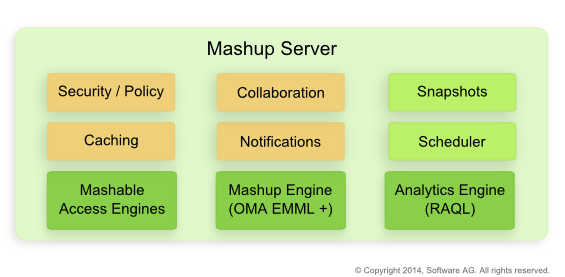MashZone NextGen Server
The MashZone NextGen Server supports design activities, discovery and governance for all MashZone NextGen mashables, mashups and apps.
 Mashables
Mashables: creating and using mashables uses
mashable access engines to handle secure access to information sources and results from all types of mashables. Common authentication protocols are supported for mashables, but these can be extended to handle custom requirements.
 Mashups
Mashups: creating and running mashups and macros based on
EMML uses the Mashup Engine.
MashZone NextGen extends OMA
EMML to provide:

Secure invocation of mashable information sources, including database mashables.

Direct invocation of accessible, unregistered information sources.

Direct invocation of SQL commands in databases.

Access to large, streaming datasets supported by the
Real-Time Analytics Query Language. (Data access support and other features of
RAQL are discussed later in this introduction.)

Execution of
RAQL queries to analyze, filter, sort and group large datasets.

Load or store large datasets and query results in the
MashZone NextGen Analytics In-Memory Stores.
The Mashup Engine interprets EMML and includes a scripting engine to handle scripting hooks to custom logic and support for EMML macros. Mashup statements to invoke mashables are handled by the appropriate mashable access engine leveraging the mashable security framework.
The Mashup Engine works in conjunction with the Analytics Engine to handle EMML extension statements that work with large, streaming datasets and run RAQL queries.
 Apps
Apps: creating and running apps is based on the App Specification. Apps that use mashables and mashups use the Mashable Access Engines or the Mashup Engine for those resources.
The MashZone NextGen Server also provides the following features:
 Snapshots
Snapshots: allows users to run mashables or mashups and save snapshots of results for use in analysis or mashups. Snapshots can be user initiated or scheduled to support automatic snapshots for trend analysis.
 Collaboration and Notifications
Collaboration and Notifications: allows sharing between users for discovered artifacts. Both sharing and the app publishing workflow generate notifications.
Notifications can be sent via email, if mail is configured in the MashZone NextGen Server. Users can also see notifications in the MashZone NextGen Hub home page or My Apps in the AppDepot.
 Caching
Caching: caching can be configured for mashable and mashup results to enhance performance. Caching configuration uses a flexible inheritance policy to easily define caching requirements for different types of mashables and mashups but also support individual requirements.
MashZone NextGen has built-in support for clustered caching using BigMemory or memcached.
 Security
Security: this includes both authentication and authorization for users when mashables, mashups or apps are viewed or run. The
MashZone NextGen Server also handles authentication with mashable information sources when they are run.
The MashZone NextGen Server is integrated with your user repository or identity server for user authentication. This can be basic authentication, secure connections and certificates or a single sign-on solution.
You define authorization policies for MashZone NextGen resources determining who can view or run mashables, mashups and apps. Generally, users must be authenticated, but you can also define unlimited access, allowing 'guest' users without authentication to work with apps that are published to web sites, wikis or other environments.
Authorization policies also include entitlements in MashZone NextGen Hub and the AppDepot. You can determine access to specific tools and features based on authorization policies.

